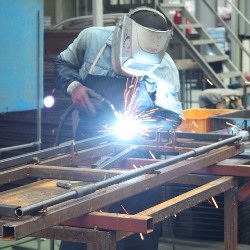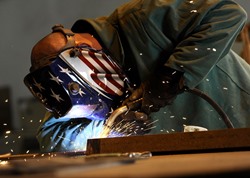How to Pick the Right Welder Training Program near Yantic Connecticut
 Enrolling in the right welder school near Yantic CT is an important first step to beginning your new occupation as a professional welder. But since there are so many schools to choose from, how do you determine which ones to consider? And more notably, once you have fine tuned your alternatives, how do you pick the best one? Many prospective students start by looking at the schools that are closest to their homes. Once they have found those that are within driving distance, they gravitate toward the cheapest one. Yes, location and tuition cost are necessary considerations when evaluating welder vocational schools, but they are not the only ones. Other factors include such things as reputation, accreditation and job placement rates. So before starting your search for a vocational school to become a welder, it’s sensible to develop a list of qualifications that your selected school must have. But before we explore our due diligence checklist, let’s cover a little bit about how to become a welder.
Enrolling in the right welder school near Yantic CT is an important first step to beginning your new occupation as a professional welder. But since there are so many schools to choose from, how do you determine which ones to consider? And more notably, once you have fine tuned your alternatives, how do you pick the best one? Many prospective students start by looking at the schools that are closest to their homes. Once they have found those that are within driving distance, they gravitate toward the cheapest one. Yes, location and tuition cost are necessary considerations when evaluating welder vocational schools, but they are not the only ones. Other factors include such things as reputation, accreditation and job placement rates. So before starting your search for a vocational school to become a welder, it’s sensible to develop a list of qualifications that your selected school must have. But before we explore our due diligence checklist, let’s cover a little bit about how to become a welder.
Welding Degree and Certificate Programs
 There are multiple alternatives available to receive training as a welder in a technical or trade school. You can obtain a a certificate, a diploma or an Associate Degree. Bachelor Degrees are available in Welding Technology or Welding Engineering, but are more advanced degrees than most journeyman welders will need. Some programs are also offered along with an apprenticeship program. Below are brief explanations of the most typical welding programs available in the Yantic CT.
There are multiple alternatives available to receive training as a welder in a technical or trade school. You can obtain a a certificate, a diploma or an Associate Degree. Bachelor Degrees are available in Welding Technology or Welding Engineering, but are more advanced degrees than most journeyman welders will need. Some programs are also offered along with an apprenticeship program. Below are brief explanations of the most typical welding programs available in the Yantic CT.
- Certificate and Diploma Programs are normally made available by technical and trade schools and take about 1 year to complete. They are more hands-on training in nature, designed primarily to develop welding skills. They can provide a good foundation for a new journeyman or apprentice welder, or supplemental skills for experienced welders.
- Associate Degree Programs will take two years to complete and are most often offered by community colleges. An Associate Degree in Welding Technology provides a more extensive education than the diploma or certificate while still providing the foundation that prepares students to enter the workforce.
A number of municipalities and states do have licensing prerequisites for welders, so be sure to find out for your location of potential employment. As needed, the welding school you choose should ready you for any licensing examinations that you will have to pass in addition to furnishing the proper training to become a qualified welder.
Welder Certification Options
 There are various organizations that provide welding certifications, which evaluate the knowledge and skill level of those applying. A large number of Yantic CT employers not only demand a certificate or degree from an accredited welding school, but also certification from a respected agency such as the American Welding Society (AWS). A variety of certifications are available based upon the kind of work that the welder performs. Some of the things that certification can acknowledge are the welder’s ability to
There are various organizations that provide welding certifications, which evaluate the knowledge and skill level of those applying. A large number of Yantic CT employers not only demand a certificate or degree from an accredited welding school, but also certification from a respected agency such as the American Welding Society (AWS). A variety of certifications are available based upon the kind of work that the welder performs. Some of the things that certification can acknowledge are the welder’s ability to
- Work in compliance with specific codes
- Work with specified metal thicknesses
- Work with certain kinds of welds
- Perform according to contract specifications
As formerly stated, some states, cities or local municipalities have licensing requirements for welders. Of those requiring licensing, a number also require certification for various kinds of work. Certification is also a means to demonstrate to employers that you are an exceptionally skilled and experienced welder. So similarly as with licensing, check the requirements for your location and make sure that the welding technical school you decide on readies you for certification as needed.
Questions to Ask Welding Trade Programs
 Once you have chosen the credential you want to obtain, a certificate, diploma or degree, you can start to evaluate schools. As you are no doubt aware, there are a large number of welder trade and technical schools in the Yantic CT area. That’s why it’s necessary to determine in advance what qualifications your school of choice must have. We have previously covered 2 significant ones that many people look at first, which are location and the cost of tuition. As mentioned, although they are essential qualifiers, they are not the only ones that must be looked at. After all, the school you select is going to provide the instruction that will be the foundation of your new career as a welder. So following are some additional factors you might want to consider before picking a welder trade school.
Once you have chosen the credential you want to obtain, a certificate, diploma or degree, you can start to evaluate schools. As you are no doubt aware, there are a large number of welder trade and technical schools in the Yantic CT area. That’s why it’s necessary to determine in advance what qualifications your school of choice must have. We have previously covered 2 significant ones that many people look at first, which are location and the cost of tuition. As mentioned, although they are essential qualifiers, they are not the only ones that must be looked at. After all, the school you select is going to provide the instruction that will be the foundation of your new career as a welder. So following are some additional factors you might want to consider before picking a welder trade school.
Accreditation. It’s essential that the welder tech school you select is accredited by either a national or a regional agency. There are 2 standard kinds of accreditation. The school may attain Institutional Accreditation based on all of their programs. Programmatic Accreditation is based on a single program the school offers, such as Welding Technology. So verify that the program you select is accredited, not just the school itself. Also, the accreditation should be by a U.S. Department of Education recognized accrediting agency, like the Accrediting Commission of Career Schools and Colleges of Technology (ACCSCT). Besides helping ensure that you obtain a quality education, the accreditation might also help in getting financial assistance or student loans, which are frequently not offered in Yantic CT for non-accredited schools. Finally, for those states or municipalities that mandate licensing, they may require that the welding training program be accredited also.
Job Assistance and Apprenticeship Programs. A large number of welding degree or certificate programs are offered in conjunction with an apprenticeship program. Other schools will help place you in a job or an apprenticeship after graduation. Find out if the schools you are reviewing help in placing students in apprenticeships or have a job placement program. The schools must have relationships with local unions and various metal working businesses to which they can place their students. More established schools may have a more substantial network of graduates that they can utilize for placements. These programs can help students find employment and develop associations within the Yantic CT welding community.
Job Placement and Completion Rates. The completion rate is the percentage of students that begin an instructional program and complete it. It’s essential that the welding school you choose has a high completion rate. A reduced rate could indicate that the students who joined the program were unhappy with the instruction, the teachers, or the facilities, and dropped out. The job placement rate is also a good indicator of the quality of training. A high job placement rate will not only affirm that the school has a good reputation within the field, but additionally that it has the network of Yantic CT contacts to assist students obtain apprenticeships or employment after graduation.
Modern Facilities and Equipment. Once you have narrowed down your selection of welding programs to two or three options, you should think out visiting the campuses to inspect their facilities. Verify that both the facilities and the equipment that you will be trained on are modern. Specifically, the training equipment should be comparable to what you will be working with in the field. If you are unsure what to look for, and are already in an apprenticeship program, consult with the master welder you are working under for guidance. Otherwise, ask a local Yantic CT welding contractor if they can give you some pointers.
School Location. Although we previously briefly covered the relevance of location, there are a couple of additional issues that we need to cover. You should bear in mind that unless you are able to move, the welder school you select needs to be within commuting distance of your Yantic CT home. If you do opt to attend an out-of-state school, besides moving expenses there could be higher tuition fees for out-of-state residents. This is particularly the case for welding certificate programs offered by community colleges. Additionally, if the school provides an apprenticeship or job placement program, often their placements are within the school’s local community. So the location of the school should be in a region or state where you subsequently will wish to work.
Smaller Classes. Personalized instruction is important for a manual trade such as welding. It’s easy to get overlooked in bigger classes and not get much individualized training. Ask what the typical class size is for the welder programs you are considering. Ask if you can sit in on a few classes so that you can observe how much personal attention the students are getting. While there, talk with a few of the students and get their opinions. Also, speak with some of the trainers and find out what their welding experience has been and what certifications and credentials they have earned.
Flexible Class Scheduling. Many people learn a new trade while still employed at their current job. Verify that the class schedules for the schools you are reviewing are convenient enough to satisfy your needs. If you can only go to classes in the evenings or on weekends near Yantic CT, make certain that the schools you are considering offer those alternatives. If you can only enroll part-time, make sure that the school you choose offers part-time enrollment. Also, ask what the policy is to make up classes should you miss any due to illness, work or family emergencies.
Online Welding Degree and Certificate Programs
 Welding is very much a hands-on kind of profession, and for that reason not very compatible with online training. Even so, there are some online welding courses offered by specific community colleges and vocational schools in the greater Yantic CT area that can be credited toward a certificate or degree program. These courses mainly cover such subjects as safety, reading blueprints, and metallurgy. They can help give a novice a foundation to start their training and education. However, the most significant point is that you can’t learn how to weld or work with welding materials until you actually do it. Clearly that can’t be accomplished online. These skills have to be learned in an on-campus setting or in an apprenticeship. Online or distance learning is better suited for seasoned welders that would like to advance their knowledge or possibly attain a more advanced degree. So if you should find an online welding degree or certificate program, be very cautious and verify that the larger part of the training is done on campus or in a workshop type of environment.
Welding is very much a hands-on kind of profession, and for that reason not very compatible with online training. Even so, there are some online welding courses offered by specific community colleges and vocational schools in the greater Yantic CT area that can be credited toward a certificate or degree program. These courses mainly cover such subjects as safety, reading blueprints, and metallurgy. They can help give a novice a foundation to start their training and education. However, the most significant point is that you can’t learn how to weld or work with welding materials until you actually do it. Clearly that can’t be accomplished online. These skills have to be learned in an on-campus setting or in an apprenticeship. Online or distance learning is better suited for seasoned welders that would like to advance their knowledge or possibly attain a more advanced degree. So if you should find an online welding degree or certificate program, be very cautious and verify that the larger part of the training is done on campus or in a workshop type of environment.
Attending a Welding School in Yantic CT?
If you have decided to enroll in a welder training program in the Yantic Connecticut area, you may find the following information both informative and helpful about the location of your new school campus.
Neighborhoods of Norwich, Connecticut
Bean Hill was originally a separate village, located about a mile from the center of Norwich in close proximity to the Norwichtown Green. It was founded by a group of Episcopalians around a small green (now a public park). In the early 19th century it was the site of the Norwich Methodist Episcopal Church, which met in a building that also housed a classical academy and a free school.[1] The African American abolitionist David Ruggles grew up in Bean Hill[1] and had an Underground Railroad stop in this area in one of the houses. Several of the old colonial houses and the Methodist church building (now a photographic and investment business) still stand. Modern Bean Hill grew in all directions with the coming of a highway on and off ramp depositing into the area just below the green. This area is now commercial with numerous gas stations, a Courtyard Marriott and a park and ride. Extending out from the Green are more commercial establishments, small shopping centers and, to the northeast, residential neighborhoods. The copper company Phelps Dodge is located in the farther reaches of Bean Hill next to old mills.
Because of its location at the Y-fork of the Thames, Shetucket and Yantic Rivers, Chelsea became the home of the city's former shipping harbor located on Hollyhock Island. Because of Norwich's industrial and commercial nature, this neighborhood is quite large, with its borders extending from Washington Street in the west to Burnham Square in the east.
At the core of Norwich's downtown are the harbor and a dense grouping of 18th-century buildings that are still mostly intact.[2] The majority of big business, including the Wauregan Hotel, Reid and Hughes, Sears, Woolworth's and Chelsea Groton Bank, developed around Centennial Square before either closing altogether or moving out of the city or to East Great Plain with the economic tide. Numerous churches and historic homes, the former YMCA of Southeastern Connecticut[3] and Post Office are also in and around Chelsea. The old train station and tracks are located here also, along with the city's grand Second Empire-style (1870) City Hall, New London County Superior Court, CLA Engineers and the Otis Library. The oldest remaining building in the city, Chelsea Landing Pub, is located here as well. The main public areas in this district are Centennial (aka Franklin) Square, City Hall Square and Howard T. Brown Memorial Park. The offices of the Norwich Bulletin are located in the former railroad station, most recently the site of the St. Vincent De Paul soup kitchen. The newspaper's previous longtime location, the Sunshine Building and the main newspaper building on Franklin Street in the north, just below the AT&T offices next to City Hall, is now vacant. The original Otis Library was in a small brick building across the square from City Hall. In 2007 it moved from its previous location on Main Street, into a new Mission-style building on Main Street that incorporates its previous and adjacent locations.
Select the Ideal Welding Technical Program Yantic CT
Picking the best welding training program will probably be the most critical decision you will make to begin your new profession. You originally stopped by our website because you had an interest in Welding Night Courses. However, as we have covered in this article, there are a number of factors that you will need to examine and compare among the programs you are reviewing. It’s a necessity that any welding school that you are examining includes a good deal of hands-on training. Classes need to be smaller in size and every student must have their personal welding machine to train on. Classroom education needs to offer a real-world perspective, and the curriculum should be up-to-date and conform with industry standards. Courses vary in length and the type of credential provided, so you will need to ascertain what length of program and degree or certificate will best fulfill your needs. Each program offers unique possibilities for certification also. Probably The ideal means to research your short list of schools is to go to each campus and speak with the students and instructors. Take the time to monitor some classes. Tour the campus and facilities. Make certain that you are confident that the program you choose is the ideal one for you. With the right training, hard work and dedication, the end result will be a new trade as a professional welder in Yantic CT.
Business Results 1 - 10 of 4



